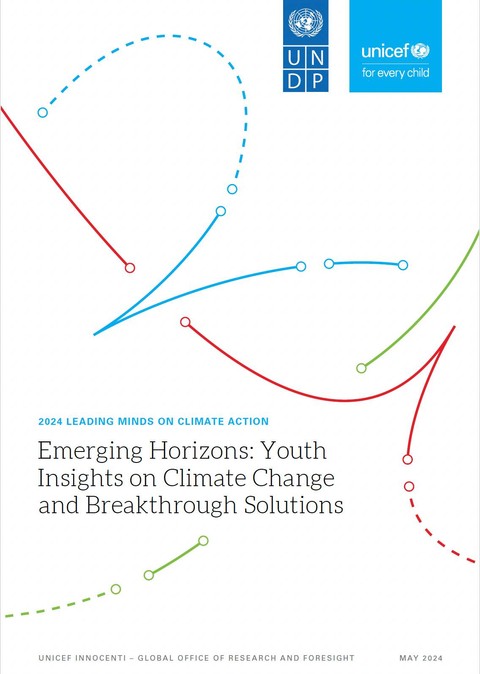
In 2023, 100 proponents of climate-related projects were gathered by UNDP in an event called "Youth4Climate: Sparking Solutions". During this event, the participants took part in a participatory foresight workshop designed by UNICEF Innocenti. "Emerging Horizons" shares the insights that came out from the workshop.
The workshop used a classic foresight tool called the Three Horizons: "This approach helps us to recognize that three horizons exist always in the present moment -- the current system that is declining or the pattern being lived right now (Horizon 1), the vision of a better future that is rising (Horizon 3), and the area of innovation and disruption that will either be captured to maintain the old system or harnessed to bring about the new (Horizon 2)."
The Three Horizons are not alternative futures, rather co-existing visions of the future at any given moment. The insights from each Horizon therefore complement themselves.
Horizon 1: "Business As Usual"
This first horizon sees a continuation of traditional governance and policymaking which is both top-down, and reactive rather than proactive. The main drivers for public and private action are economic and focused on the short term. Climate literacy is low, societies as well as individuals are unprepared for climate shocks. Social disparities are high and growing.
However, the participants identified three assets they wish to carry forward in the future: progress on energy efficiency and renewable energies; community engagement and leveraging "indigenous knowledge"; capitalism, seen as a source of economic development and of a "plethora of life choices".
Horizon 3: "Visions of the Future"
The common vision was that of an ecologically sustainable, just and equitable world, also providing economic and job opportunities. Innovation and technology are seen by the young innovators as "pivotal", leading to (and relying on) "smart government" and lifelong learning, including on climate where the group calls for "integrating indigenous knowledge". A second foundation is community engagement and local initiatives.
Horizon 2: "Innovation and disruption"
The participants imagined an interplay between modernity and traditional practices, for example in agriculture, but also in urban planning where they call for "repurposing ageing infrastructures" rather than just replacing them.
The vision of innovation focuses on:
- Renewable energy and sustainable practices, highlighting local and peer-to-peer production and storage (with the help of AI and Blockchain);
- Digitization, however with a concern for overreliance on technology;
- Community engagement, peer to peer initiatives, and active participation of youths in decision-making.
- Economic fluidity, opportunities for innovation, and a "circular economy" model.
Tension points and further research
Finally, the group highlighted three key conditions of change:
- Transforming governance and policymaking through community-centric approaches;
- Embedding equity in economic models for renewable energy transition;
- Advancing eco-literacy as a catalyst for transformative change.
